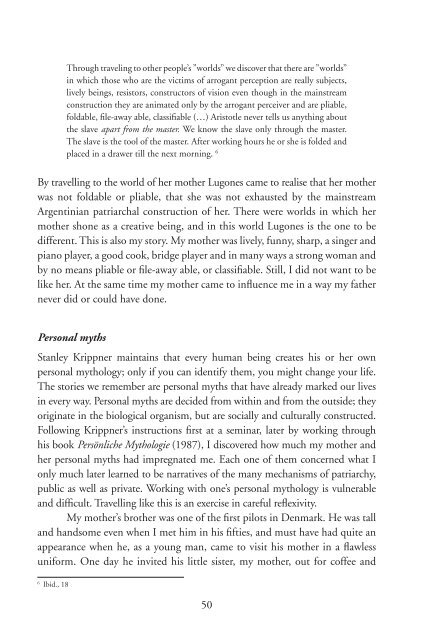Teaching Subjectivity. Travelling Selves for Feminist ... - MailChimp
Teaching Subjectivity. Travelling Selves for Feminist ... - MailChimp
Teaching Subjectivity. Travelling Selves for Feminist ... - MailChimp
Create successful ePaper yourself
Turn your PDF publications into a flip-book with our unique Google optimized e-Paper software.
Through traveling to other people’s ”worlds” we discover that there are ”worlds”<br />
in which those who are the victims of arrogant perception are really subjects,<br />
lively beings, resistors, constructors of vision even though in the mainstream<br />
construction they are animated only by the arrogant perceiver and are pliable,<br />
foldable, file-away able, classifiable (…) Aristotle never tells us anything about<br />
the slave apart from the master. We know the slave only through the master.<br />
The slave is the tool of the master. After working hours he or she is folded and<br />
placed in a drawer till the next morning. 6<br />
By travelling to the world of her mother Lugones came to realise that her mother<br />
was not foldable or pliable, that she was not exhausted by the mainstream<br />
Argentinian patriarchal construction of her. There were worlds in which her<br />
mother shone as a creative being, and in this world Lugones is the one to be<br />
different. This is also my story. My mother was lively, funny, sharp, a singer and<br />
piano player, a good cook, bridge player and in many ways a strong woman and<br />
by no means pliable or file-away able, or classifiable. Still, I did not want to be<br />
like her. At the same time my mother came to influence me in a way my father<br />
never did or could have done.<br />
Personal myths<br />
Stanley Krippner maintains that every human being creates his or her own<br />
personal mythology; only if you can identify them, you might change your life.<br />
The stories we remember are personal myths that have already marked our lives<br />
in every way. Personal myths are decided from within and from the outside; they<br />
originate in the biological organism, but are socially and culturally constructed.<br />
Following Krippner’s instructions first at a seminar, later by working through<br />
his book Persönliche Mythologie (1987), I discovered how much my mother and<br />
her personal myths had impregnated me. Each one of them concerned what I<br />
only much later learned to be narratives of the many mechanisms of patriarchy,<br />
public as well as private. Working with one’s personal mythology is vulnerable<br />
and difficult. <strong>Travelling</strong> like this is an exercise in careful reflexivity.<br />
My mother’s brother was one of the first pilots in Denmark. He was tall<br />
and handsome even when I met him in his fifties, and must have had quite an<br />
appearance when he, as a young man, came to visit his mother in a flawless<br />
uni<strong>for</strong>m. One day he invited his little sister, my mother, out <strong>for</strong> coffee and<br />
6<br />
Ibid., 18<br />
50

















